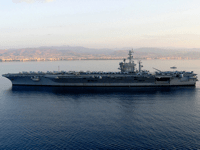Times are changing in the Eastern Mediterranean, defined for the purposes of this article as the area bounded to the north by Greece and Turkey, to the south by Egypt and to the east by the Levantine coast. The area has recently been the scene of several naval incidents sparked by the Arab-Israeli and related conflicts as well as by equally well-established tensions between Greece and Turkey, largely -- but not wholly -- over the divided island of Cyprus and related issues. As U.S. naval priorities shift and those of Europe decline, major offshore energy discoveries have raised tensions and focused attention on the naval balance of power in the region.
Historically the area has been contested by great powers, most recently by the U.S. Sixth Fleet and the Soviet navy, the latter of which was granted base facilities at various times by friendly Arab states. The end of the Cold War saw that period fade away, although significant relics of it remain in Russia's relationship with Syria. The residual Sixth Fleet is also but a shadow of its former self, with the Italian-based command ship the USS Mount Whitney being the only permanently based asset. The Sixth Fleet’s strength fluctuates widely from a full-scale carrier battle group transiting between the Atlantic and Indian oceans; to the force deployed against Libya, which included an amphibious flat top; to the destroyer and coastguard cutter that accompanied the Mount Whitney to the Black Sea in 2008, when the U.S. engaged in gentle gunboat diplomacy to demonstrate its concern following the Russia-Georgia War.
The Turkish Navy’s Force Structure

